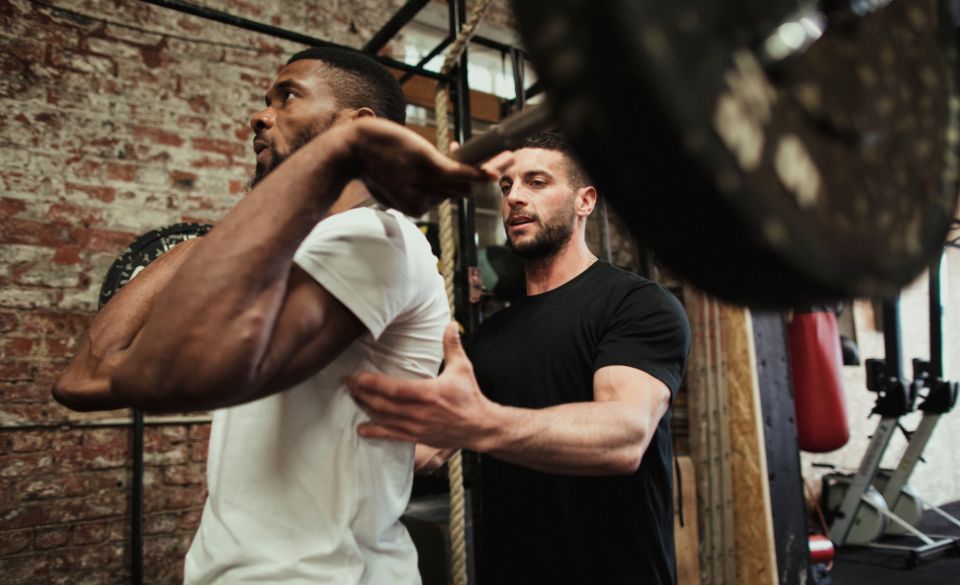
Shoulder Support for Weightlifting: Improve and Prevent Injuries
Page Contents
Weightlifting is a great way to build strength and tone your muscles. However, it can put a lot of strain on your shoulders, which can lead to pain and injury. This is where shoulder support for weightlifting comes in. Shoulder support can help to stabilize your shoulders and reduce the risk of injury, allowing you to lift weights safely and effectively.
In this blog post, we will discuss why you may need shoulder support for weightlifting, the different types of shoulder support available, whether it’s appropriate to wear shoulder support in the gym, and when you should wear shoulder support.
Why Would You Need Shoulder Support For Weightlifting
Weightlifting is an intense physical activity that requires the use of your entire body, especially your upper body. When you engage in weightlifting, your shoulders are under constant stress as they bear the weight of the barbells and dumbbells. This can put a lot of pressure on your shoulders and make them more prone to injuries.
Shoulder support for weightlifting can help prevent injuries and provide support to your shoulders during your workout. The support can come in the form of compression sleeves, braces, or straps, which help stabilize your shoulders and reduce the risk of injury.
Shoulder support can also be beneficial for people who have experienced previous shoulder injuries or have conditions such as rotator cuff tears or shoulder impingement syndrome. These conditions can make weightlifting more difficult and even painful. Wearing shoulder support can help alleviate pain and allow you to continue with your workouts without putting additional stress on your shoulders.
In addition, shoulder support can help improve your overall performance during weightlifting. By stabilizing your shoulders, you can increase your strength and lift heavier weights, leading to better muscle gains and overall fitness.
Types Of Shoulder Support For Weightlifting
There are several types of shoulder support for weightlifting that can help provide the necessary stability and support for your shoulders during workouts. The most common types of shoulder support include compression sleeves, braces, and straps.
Compression sleeves are made of flexible, breathable materials that fit snugly over your shoulders. They apply a mild compression to your shoulders, which can help increase blood flow and reduce inflammation. Compression sleeves also provide a level of support to your shoulders, helping to stabilize the joint and prevent injuries.
Shoulder braces are typically made of neoprene or other similar materials and provide more significant support than compression sleeves. They wrap around your shoulders and chest, providing compression and support to the shoulder joint. Braces are ideal for people who have experienced previous shoulder injuries or who have shoulder instability issues.
Shoulder straps are another type of shoulder support that can be beneficial during weightlifting. They are typically made of nylon or other similar materials and wrap around your shoulders, providing additional support and stability to the shoulder joint. Straps can help take some of the weight off your shoulders, making it easier to lift heavier weights.
It is important to note that the type of shoulder support you choose may depend on your specific needs and the type of weightlifting exercises you are doing. Some exercises may require more stability than others, and some people may need more support than others depending on their previous injuries or conditions.
Can I Wear Shoulder Support In The Gym?
Yes, it is appropriate to wear shoulder support in the gym. In fact, many weightlifters wear shoulder support to help protect their shoulders and improve their performance. However, it’s important to choose the right type of shoulder support for your needs and to make sure that it fits properly.
When Should You Wear A Shoulder Support?
If you are experiencing shoulder pain or have a history of shoulder injuries, it may be beneficial to wear a shoulder support during weightlifting exercises. Additionally, if you are performing exercises that place a significant amount of stress on your shoulders, such as overhead presses or pull-ups, wearing shoulder support may help prevent injury and promote proper form.
It is important to note that while shoulder support can provide added stability and support to your shoulders, it is not a substitute for proper form and technique. It is essential to learn and practice proper form to prevent injuries and ensure that you are getting the most out of your workouts.
If you are experiencing shoulder pain, it is important to speak with a healthcare professional before using shoulder support. Your doctor or physical therapist can assess your injury and recommend the appropriate type of shoulder support to help manage your symptoms and prevent further injury.
In general, if you are experiencing any discomfort or instability in your shoulders during weightlifting exercises, it may be a good idea to wear shoulder support. This can help prevent injuries and ensure that you are able to perform exercises safely and effectively.
Ultimately, the decision to wear shoulder support during weightlifting exercises will depend on your specific needs and goals. Consider speaking with a healthcare professional or trainer to determine if shoulder support is right for you.
Conclusion
In conclusion, shoulder support for weightlifting can provide added stability and support to the shoulders, which can help prevent injuries and improve performance. There are several types of shoulder support available, including braces, straps, and compression sleeves, each with their own unique benefits.
Studies have shown that wearing shoulder support during weightlifting can be effective in reducing pain and improving function in individuals with shoulder injuries or instability. For example, a study published in the Journal of Orthopaedic and Sports Physical Therapy found that wearing a compression sleeve during a resistance training program significantly reduced pain and improved function in individuals with rotator cuff tendinopathy.
It is important to note that while shoulder support can be helpful, it is not a substitute for proper form and technique. It is essential to learn and practice proper form to prevent injuries and ensure that you are getting the most out of your workouts.
If you are experiencing shoulder pain or have a history of shoulder injuries, consider speaking with a healthcare professional to determine if shoulder support is right for you. With the right support and proper technique, you can safely and effectively perform weightlifting exercises and reach your fitness goals.



